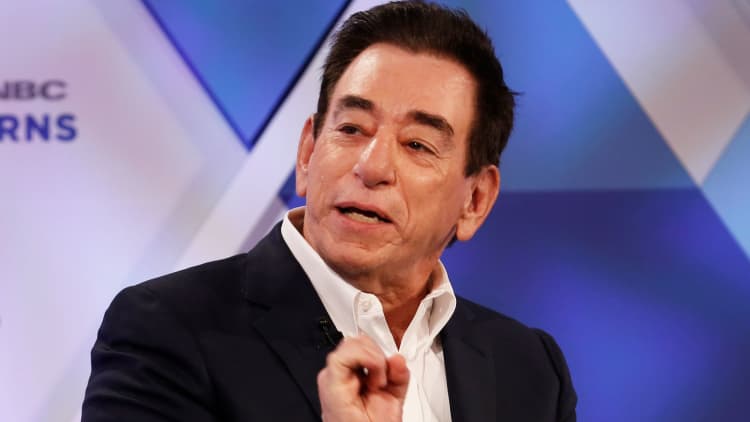
Sanofi and Regeneron have agreed to lower the price of their cholesterol medicine in exchange for easier access for patients covered by pharmacy benefit manager Express Scripts, the first of a number of deals the drugmakers hope to strike to increase use of the medicine.
The Sanofi and Regeneron drug, called Praluent, will also be the only one in its class covered on Express Scripts' 25 million-member National Preferred Formulary Plan, which will exclude a competing medicine made by Amgen, the companies said Tuesday.
Amgen and Express Scripts shares were down nearly 2 percent in Tuesday's premarket, while Regeneron and Sanofi were down less than 1 percent.
Praluent's new price will be $4,500 to $8,000 per year, the range recommended in March by the Institute for Clinical and Economic Review, or ICER, an unaffiliated pharmacoeconomics group, Regeneron said. That's down from a list price of $14,600 set when the drug was approved in 2015.
The price reduction will come in the form of a rebate; the list price itself won't change. In March, Regeneron and Sanofi said they planned to strike such deals because so many patients were having trouble accessing the drug due to barriers from insurers and high co-pays.
"This paradigm-shifting agreement is designed to break the gridlock so that Praluent is finally able to reach patients most in need," Regeneron Chief Executive Officer Len Schleifer said in a statement Tuesday. He noted cardiologists in the U.S. "have experienced unprecedented challenges in securing access for Praluent for patients who were clearly appropriate, but were denied coverage."
Praluent, along with Amgen's drug, Repatha, is in a class of medicines known as PCSK9 inhibitors, first approved by the Food and Drug Administration in 2015 to lower LDL, or so-called bad cholesterol, in patients who don't get enough benefit from statins like Lipitor.
The medicines were expected to be commercial blockbusters, given the millions of Americans with high cholesterol, but sales have disappointed. Praluent drew $195 million in 2017 revenue, while Repatha brought in $319 million.
Analysts expected that longer-term studies proving that the drugs help reduce the risk of heart attack and stroke would help spur sales; Amgen's results came last year, while Regeneron and Sanofi's were reported in March.
But with the latter results, Regeneron and Sanofi also pledged to lower the price of Praluent to try to open up access, after a pattern of reimbursement trouble Schleifer started referring to as "#deniedRx."
A report in March took the new data into consideration. ICER calculated two price ranges for Praluent based on patients' risk levels. The $4,500 to $8,000 range was for higher-risk patients: those who had had a recent coronary event, like a heart attack, with LDL cholesterol of more than 100 milligrams per deciliter, despite intensive treatment with statins.
For all other patients who had recently had an acute coronary event, ICER recommended a price of $2,300 to $3,400 per year for Praluent. The deal with Express Scripts is for all patients eligible for the medicine.
A spokeswoman for Amgen, Kristen Davis, said Tuesday that the company is "disappointed" with Express Scripts' decision to exclude Repatha from its National Preferred Formulary, noting the pact will affect about 2,000 patients taking the medicine.
Davis also noted the plan represents about a third of Express Scripts' business, and "Amgen can still compete for the other two-thirds where we are continuing to offer significant discounts and rebates on Repatha in exchange for improved patient access."
Sales of Repatha more than doubled in the first quarter, compared with the same period last year, to $123 million.
"We have been aggressively negotiating with several payers for months now to expand patient access to Repatha," Davis said. "We are offering significant discounts that are in line with our competitors and have multiple offers pending."
Express Scripts Chief Medical Officer Steve Miller said the decision to only cover Regeneron and Sanofi's drug on that plan came down to the clinical data.
"The reason to exclude the Amgen product is: while both of them work in a very similar manner, the data is really good for Praluent," Miller said in an interview on CNBC's "Squawk Box" Tuesday.
Citing the longer-term study data presented in March, Miller noted "the drug could actually decrease heart attacks, decrease strokes, but actually also decrease mortality. So this drug can allow people to live longer and better lives."
The agreement is also designed to streamline prescribing of the medicine, the companies said.
Starting July 1, physicians will have to fill out a simplified form confirming the medicine is appropriate for the patient, based on what it has approved to treat and the patient's profile. The companies call that a "significant simplification" from the current system, which requires multiple steps and lots of paperwork, from lab results to detailed patient histories.
Also starting in July, Express Scripts will pass a portion of the rebates from Regeneron and Sanofi directly to patients, aiming to lower their out-of-pocket costs at the pharmacy counter. Payers are increasingly adopting these so-called point-of-sale rebates amid the debate over drug prices. That's a change from the practice of distributing rebates across plan beneficiaries to lower premiums.
Regeneron said it's in active discussions with other payers to strike similar deals.

